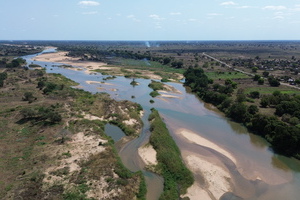Sustainability
- Home
- Locations
- What you can do
- LiFE Framework
- Sustainable Development Goals
- About us
- Grants
- Events
- Contact us
Now searching for:

The Limpopo River in southern Africa is overutilised by over 20 million people from five countries.
Environmental flows, or e-flows, are more than just water allocations. They’re lifelines for rivers, wetlands, and the communities that depend on them. By restoring natural flow patterns, e-flows help revive biodiversity, strengthen ecosystems, and support sustainable livelihoods. Dr. Gordon O’Brien, Senior Fellow in Water at the Gulbali Institute, leads the CSU-Oppenheimer Generation Sustainable African Rivers Initiative.
Drawing on 13 global case studies, his research reveals what makes e-flow programs succeed, and how they deliver biodiversity gains. The review shares proven strategies to halt freshwater biodiversity loss, build partnerships, and equip the next generation of e-flow leaders with tools for adaptive water management. Backed by growing global policy support and funding, e-flows are emerging as powerful, nature-based solutions, reducing flood risks, restoring fisheries, and boosting climate resilience.
Find out more about
Environmental flows